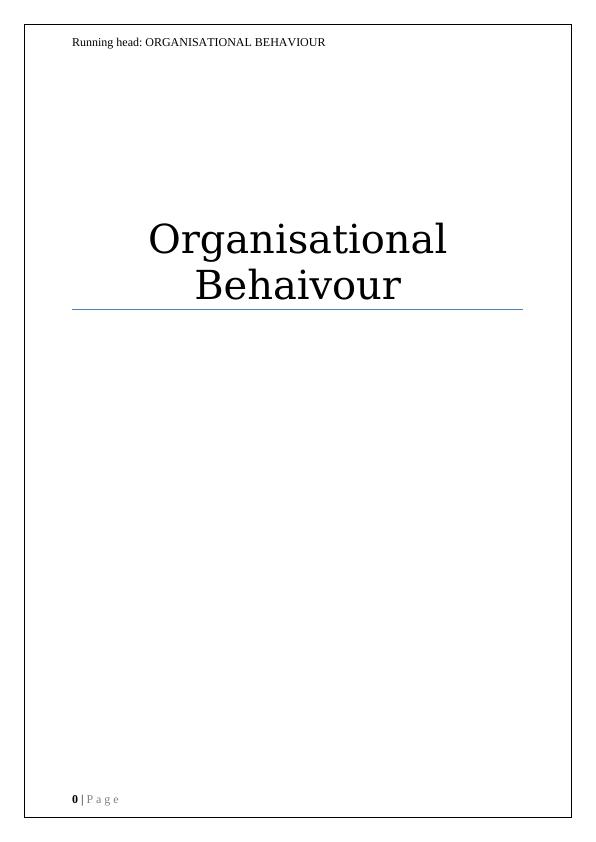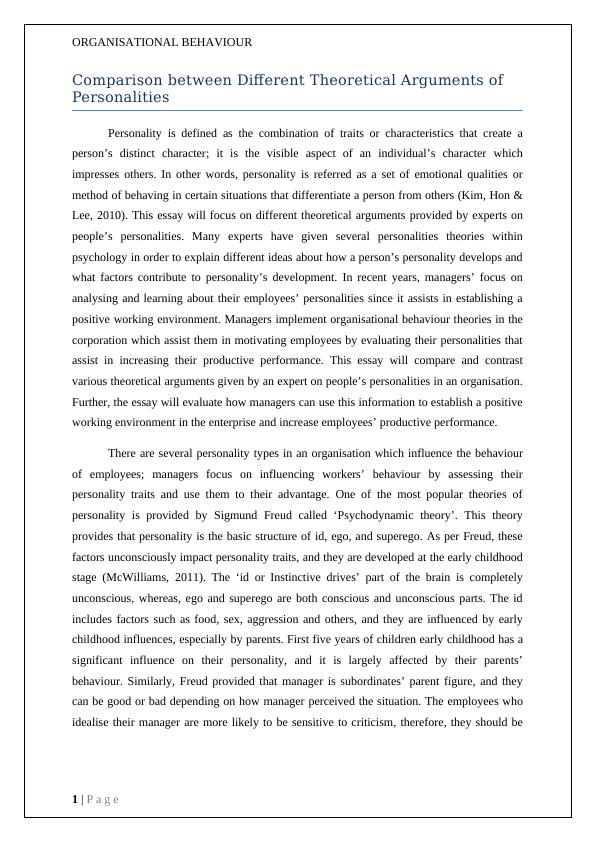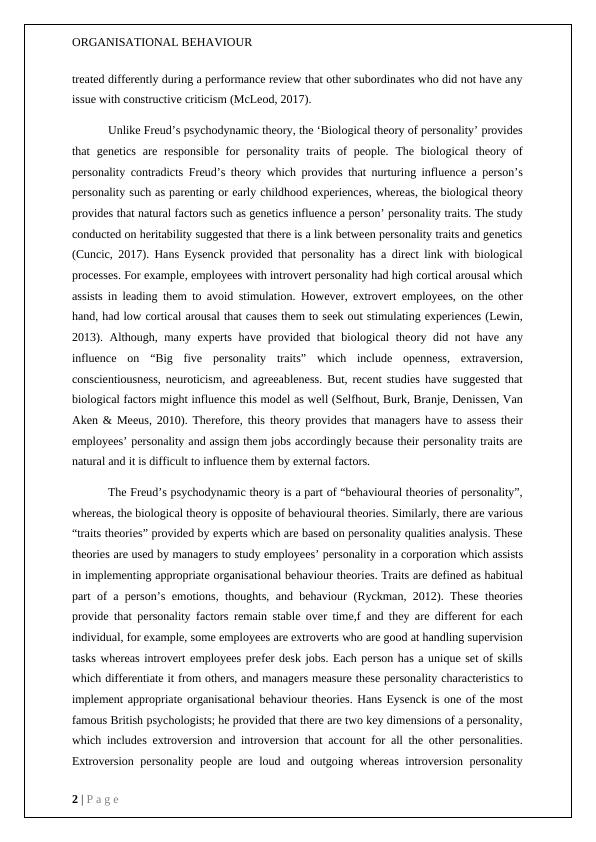Essay on Personalities (Doc)
Added on 2020-05-16
7 Pages2215 Words61 Views
Running head: ORGANISATIONAL BEHAVIOUR
Organisational
Behaivour
0 | P a g e
Organisational
Behaivour
0 | P a g e

ORGANISATIONAL BEHAVIOUR
Comparison between Different Theoretical Arguments of
Personalities
Personality is defined as the combination of traits or characteristics that create a
person’s distinct character; it is the visible aspect of an individual’s character which
impresses others. In other words, personality is referred as a set of emotional qualities or
method of behaving in certain situations that differentiate a person from others (Kim, Hon &
Lee, 2010). This essay will focus on different theoretical arguments provided by experts on
people’s personalities. Many experts have given several personalities theories within
psychology in order to explain different ideas about how a person’s personality develops and
what factors contribute to personality’s development. In recent years, managers’ focus on
analysing and learning about their employees’ personalities since it assists in establishing a
positive working environment. Managers implement organisational behaviour theories in the
corporation which assist them in motivating employees by evaluating their personalities that
assist in increasing their productive performance. This essay will compare and contrast
various theoretical arguments given by an expert on people’s personalities in an organisation.
Further, the essay will evaluate how managers can use this information to establish a positive
working environment in the enterprise and increase employees’ productive performance.
There are several personality types in an organisation which influence the behaviour
of employees; managers focus on influencing workers’ behaviour by assessing their
personality traits and use them to their advantage. One of the most popular theories of
personality is provided by Sigmund Freud called ‘Psychodynamic theory’. This theory
provides that personality is the basic structure of id, ego, and superego. As per Freud, these
factors unconsciously impact personality traits, and they are developed at the early childhood
stage (McWilliams, 2011). The ‘id or Instinctive drives’ part of the brain is completely
unconscious, whereas, ego and superego are both conscious and unconscious parts. The id
includes factors such as food, sex, aggression and others, and they are influenced by early
childhood influences, especially by parents. First five years of children early childhood has a
significant influence on their personality, and it is largely affected by their parents’
behaviour. Similarly, Freud provided that manager is subordinates’ parent figure, and they
can be good or bad depending on how manager perceived the situation. The employees who
idealise their manager are more likely to be sensitive to criticism, therefore, they should be
1 | P a g e
Comparison between Different Theoretical Arguments of
Personalities
Personality is defined as the combination of traits or characteristics that create a
person’s distinct character; it is the visible aspect of an individual’s character which
impresses others. In other words, personality is referred as a set of emotional qualities or
method of behaving in certain situations that differentiate a person from others (Kim, Hon &
Lee, 2010). This essay will focus on different theoretical arguments provided by experts on
people’s personalities. Many experts have given several personalities theories within
psychology in order to explain different ideas about how a person’s personality develops and
what factors contribute to personality’s development. In recent years, managers’ focus on
analysing and learning about their employees’ personalities since it assists in establishing a
positive working environment. Managers implement organisational behaviour theories in the
corporation which assist them in motivating employees by evaluating their personalities that
assist in increasing their productive performance. This essay will compare and contrast
various theoretical arguments given by an expert on people’s personalities in an organisation.
Further, the essay will evaluate how managers can use this information to establish a positive
working environment in the enterprise and increase employees’ productive performance.
There are several personality types in an organisation which influence the behaviour
of employees; managers focus on influencing workers’ behaviour by assessing their
personality traits and use them to their advantage. One of the most popular theories of
personality is provided by Sigmund Freud called ‘Psychodynamic theory’. This theory
provides that personality is the basic structure of id, ego, and superego. As per Freud, these
factors unconsciously impact personality traits, and they are developed at the early childhood
stage (McWilliams, 2011). The ‘id or Instinctive drives’ part of the brain is completely
unconscious, whereas, ego and superego are both conscious and unconscious parts. The id
includes factors such as food, sex, aggression and others, and they are influenced by early
childhood influences, especially by parents. First five years of children early childhood has a
significant influence on their personality, and it is largely affected by their parents’
behaviour. Similarly, Freud provided that manager is subordinates’ parent figure, and they
can be good or bad depending on how manager perceived the situation. The employees who
idealise their manager are more likely to be sensitive to criticism, therefore, they should be
1 | P a g e

ORGANISATIONAL BEHAVIOUR
treated differently during a performance review that other subordinates who did not have any
issue with constructive criticism (McLeod, 2017).
Unlike Freud’s psychodynamic theory, the ‘Biological theory of personality’ provides
that genetics are responsible for personality traits of people. The biological theory of
personality contradicts Freud’s theory which provides that nurturing influence a person’s
personality such as parenting or early childhood experiences, whereas, the biological theory
provides that natural factors such as genetics influence a person’ personality traits. The study
conducted on heritability suggested that there is a link between personality traits and genetics
(Cuncic, 2017). Hans Eysenck provided that personality has a direct link with biological
processes. For example, employees with introvert personality had high cortical arousal which
assists in leading them to avoid stimulation. However, extrovert employees, on the other
hand, had low cortical arousal that causes them to seek out stimulating experiences (Lewin,
2013). Although, many experts have provided that biological theory did not have any
influence on “Big five personality traits” which include openness, extraversion,
conscientiousness, neuroticism, and agreeableness. But, recent studies have suggested that
biological factors might influence this model as well (Selfhout, Burk, Branje, Denissen, Van
Aken & Meeus, 2010). Therefore, this theory provides that managers have to assess their
employees’ personality and assign them jobs accordingly because their personality traits are
natural and it is difficult to influence them by external factors.
The Freud’s psychodynamic theory is a part of “behavioural theories of personality”,
whereas, the biological theory is opposite of behavioural theories. Similarly, there are various
“traits theories” provided by experts which are based on personality qualities analysis. These
theories are used by managers to study employees’ personality in a corporation which assists
in implementing appropriate organisational behaviour theories. Traits are defined as habitual
part of a person’s emotions, thoughts, and behaviour (Ryckman, 2012). These theories
provide that personality factors remain stable over time,f and they are different for each
individual, for example, some employees are extroverts who are good at handling supervision
tasks whereas introvert employees prefer desk jobs. Each person has a unique set of skills
which differentiate it from others, and managers measure these personality characteristics to
implement appropriate organisational behaviour theories. Hans Eysenck is one of the most
famous British psychologists; he provided that there are two key dimensions of a personality,
which includes extroversion and introversion that account for all the other personalities.
Extroversion personality people are loud and outgoing whereas introversion personality
2 | P a g e
treated differently during a performance review that other subordinates who did not have any
issue with constructive criticism (McLeod, 2017).
Unlike Freud’s psychodynamic theory, the ‘Biological theory of personality’ provides
that genetics are responsible for personality traits of people. The biological theory of
personality contradicts Freud’s theory which provides that nurturing influence a person’s
personality such as parenting or early childhood experiences, whereas, the biological theory
provides that natural factors such as genetics influence a person’ personality traits. The study
conducted on heritability suggested that there is a link between personality traits and genetics
(Cuncic, 2017). Hans Eysenck provided that personality has a direct link with biological
processes. For example, employees with introvert personality had high cortical arousal which
assists in leading them to avoid stimulation. However, extrovert employees, on the other
hand, had low cortical arousal that causes them to seek out stimulating experiences (Lewin,
2013). Although, many experts have provided that biological theory did not have any
influence on “Big five personality traits” which include openness, extraversion,
conscientiousness, neuroticism, and agreeableness. But, recent studies have suggested that
biological factors might influence this model as well (Selfhout, Burk, Branje, Denissen, Van
Aken & Meeus, 2010). Therefore, this theory provides that managers have to assess their
employees’ personality and assign them jobs accordingly because their personality traits are
natural and it is difficult to influence them by external factors.
The Freud’s psychodynamic theory is a part of “behavioural theories of personality”,
whereas, the biological theory is opposite of behavioural theories. Similarly, there are various
“traits theories” provided by experts which are based on personality qualities analysis. These
theories are used by managers to study employees’ personality in a corporation which assists
in implementing appropriate organisational behaviour theories. Traits are defined as habitual
part of a person’s emotions, thoughts, and behaviour (Ryckman, 2012). These theories
provide that personality factors remain stable over time,f and they are different for each
individual, for example, some employees are extroverts who are good at handling supervision
tasks whereas introvert employees prefer desk jobs. Each person has a unique set of skills
which differentiate it from others, and managers measure these personality characteristics to
implement appropriate organisational behaviour theories. Hans Eysenck is one of the most
famous British psychologists; he provided that there are two key dimensions of a personality,
which includes extroversion and introversion that account for all the other personalities.
Extroversion personality people are loud and outgoing whereas introversion personality
2 | P a g e

End of preview
Want to access all the pages? Upload your documents or become a member.
Related Documents
Psychology Assignment | Psychological Theorieslg...
|9
|2137
|369
Personality Theories: Freudian and Eysenck's Theories of Personalitylg...
|17
|3508
|168
Comparison and Contrast of Personality Theories and Their Implications for Organizationslg...
|8
|1969
|359
Comparing and Contrasting Theoretical Arguments on Personality and Its Implications for Organizationslg...
|6
|2028
|224
Psychology: Perspectives, Approaches, and Research Methodslg...
|9
|2512
|304
Essay on Theories of Personalitylg...
|6
|1513
|363